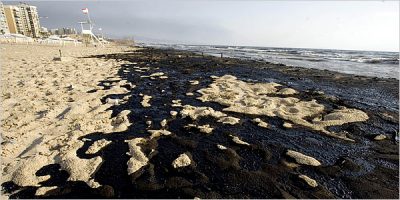 A ship carrying thick black bitumen, the same stuff found in Canada’s tar sands, sank off the coast of Oman on Sunday and its contents are now floating on the Gulf of Oman – about 40km east of the capital Muscat. Unlike Egyptian authorities, however, who frequently attempt to cover up oil spills in the Red Sea, the Ministry of Environment and Climate Affairs responded swiftly and openly to the crisis.
A ship carrying thick black bitumen, the same stuff found in Canada’s tar sands, sank off the coast of Oman on Sunday and its contents are now floating on the Gulf of Oman – about 40km east of the capital Muscat. Unlike Egyptian authorities, however, who frequently attempt to cover up oil spills in the Red Sea, the Ministry of Environment and Climate Affairs responded swiftly and openly to the crisis.
The ship, the Nisar R3, was loaded with 816 tonnes of bitumen at the time it sank.
The Iranian captain of the Cypriot vessel sent an SOS message to the Sultan Qaboos Port control tower when water began to gush into the ship, and two tugboats were dispatched to the scene.
By the time they arrived, the captain was dead and the ship had sunk, but authorities were able to rescue nine Indian sailors that were also on the boat.
The coast guard transported the sailors to the Royal Oman Police Hospital for care, according to Gulf News.
“We have formed a team of environmental experts to monitor the impact of the cargo spill from the ship,” Sulaiman Bin Nasser Al Akhzami, a senior official at the Ministry of Environment and Climate Affairs, said on Sunday.
The ministry called on private companies to help contain the spill to ensure that it would do minimum damage to Oman’s pristine marine environment and nearby desalination plants.
Booms placed around the spill are expected to prevent further spread, but the environment ministry has called on citizens to keep an eye out for possible oil slick.
Unlike Egypt, where oil spills are treated with zero transparency, Omani authorities have been very transparent in their dealings, although there is something suspect about a Cypriot-flagged vessel with an Iranian captain and nine Indian sailors.
Nonetheless, the Ministry of Environment has coordinated with the Regional Organisation for the Protection of Marine Environment (ROPME) to ensure that all hands are on deck to clean up this spill as efficiently as possible.
Bitumen occurs naturally or as a byproduct of petroleum distillation and is most frequently mixed with aggregates and used to pave roads. It is black, viscous, and no doubt toxic to fauna and flora.
Although oil spills occur all-too-regularly, Oman has one of the best protected marine environments in the Middle East with 1700km of coast line.
It is one of the best scuba diving destinations in the region and boasts prime nesting areas for Loggerhead and other turtles, among other marine species.
:: Gulf News
Image via Ministry of Environment and Climate Affairs




3 thoughts on “Ship With Black Bitumen Sinks off Oman’s Pristine Coast”
Comments are closed.